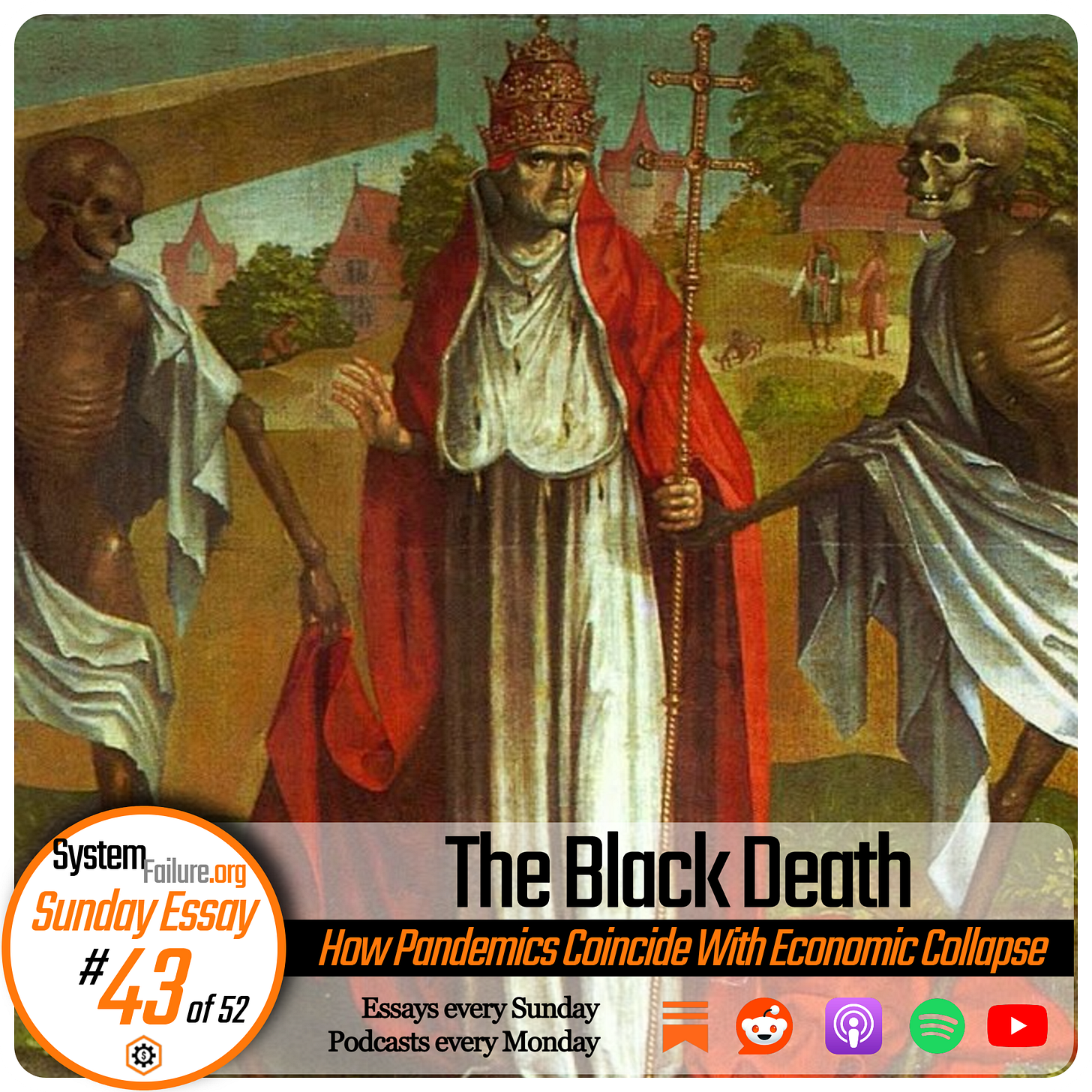The Black Death
How Pandemics Coincide With Economic Collapse
Key Takeaways:
Economic systems have lifecycles, and pandemics coincide with their births and deaths.
The Black Death caused a labor shortage that broke the economic dominance of Europe’s noble ruling class.
The Black Death also shattered the intellectual monopoly of the Roman Catholic Church.
Economic Lifecycles
Economic systems have lifecycles, and pandemics have historically coincided with their births and their deaths. Two devastating plagues, for example, attended the collapse of the Roman slave economy. As Roman civilization retreated from Europe, Medieval feudalism arose in its wake. In a dramatic change to the way labor was organized, the lords and peasants of the Middle Ages replaced the masters and slaves of Rome.
A thousand years later, as feudalism approached the end of its own lifecycle in the 1300s, that economic system was racked by the most famous plague in history: the Black Death. A cooling trend in the climate negatively impacted crop yields, weakening the populace with hunger and making people more susceptible to disease. In addition, the end of the so-called Medieval Warm Period also created a more hospitable environment for fleas carrying the Yersinia pestis bacterium that cause bubonic plague as they arrived via the trade caravans of the Silk Road. The stage was set for a disaster of biblical proportions.
To the horrified people who live through them, these major economic transitions are experienced as the end of the world. The plague was a major factor in bringing down the feudal system of lords and peasants, the only system the people of that era had ever known. Despair gripped Europe with an icy fist. But the Black Death also set in motion a chain of events that eventually gave rise to our modern system of employers and employees.
Labor Shortages
Between 1347 and 1351, the Black Death killed at least a third of the European peasantry, causing an acute labor shortage. The victim’s lymph nodes swelled into painful pustules called “buboes”, which is why the disease was called the “bubonic” plague. With so many fields lying fallow for lack of workers, the surviving peasants realized they could play one feudal lord off against another in bidding wars for their labor.
The nobility, for their part, was used to giving orders, not entertaining demands. In a desperate bid to preserve the feudal class structure, many tried to enforce a cap on the price of labor. But their actions only plunged Europe into further political chaos.
In 1381, for example, tens of thousands of enraged English peasants marched on London in revolt against laws capping wages. There would be no going back to the old Medieval production roles of lord and peasant. Today, workers rent out their labor to the highest bidder instead of swearing fealty to any particular lord. The production roles of employee and employer were born in the aftermath of the Black Death; the modern capitalist economy has its earliest origins in the labor shortage caused by that pandemic.
Collapse of Authority
In addition to breaking the economic dominance of Europe’s noble ruling class, the Black Death also shattered the intellectual monopoly held by the Roman Catholic Church. Before the advent of the germ theory of disease, the Church could only assume that the pestilence was God’s wrathful judgement.
Though the Church claimed to be in direct contact with God, no amount of praying seemed to assuage His wrath. Indeed, priests died in even greater numbers than the laity, because their performance of Last Rites brought them into disproportionate contact with infected persons.
Naturally, the Church’s utter inability to stop the dying was noticed by the public. This failure cast serious doubt on the Church’s claim to be the sole representative of God on Earth. In the centuries after the bubonic plague ravaged Europe, those doubts festered like the painful pustules of its victims. They erupted first into the Protestant Reformation and then finally blossomed into the Scientific Revolution.
As labor performed by employers and employees replaced the old feudal system organized into lords and peasants, scientific authority displaced Church authorities in the political hierarchy. Today, scientists—rather than priests—separate myth from fact on behalf of the public.
Conclusion
Economic systems have lifecycles; they arise well-suited to a certain set of historical circumstances. But as those circumstances evolve, new systems inevitably arise to take their place. Pandemics are a hallmark of the turbulent transition periods, when old systems break down. During the transition from feudalism to capitalism, the Black Death caused a labor shortage that disrupted the economic dominance of the nobility. At the same time, it also undermined the authority of the Roman Catholic Church. These terrifying events seemed like the end of the world. But in the fullness of time, they set the stage for the rise of capitalism.
Since you made it this far, patient reader, kindly consider hitting the ❤️ button above or below; it really helps!
Further Materials
The epidemic had effects in every sphere of life. As the poor died in greater proportion than the rich, a shortage of labor followed; thousands of acres were left untilled, millions of herring died a natural death. Labor enjoyed for a while an improved bargaining power; it raised its wages, repudiated many surviving feudal obligations, and staged revolts that kept noble teeth on edge for half a century; even priests struck for higher pay. Serfs left farms for cities, industry expanded, the business class made further gains on the landed aristocracy.
Will & Ariel Durant, The Reformation, 1957, page 65




I'm looking for FEEDBACK on this essay!
Let me know what you think in the text box above...